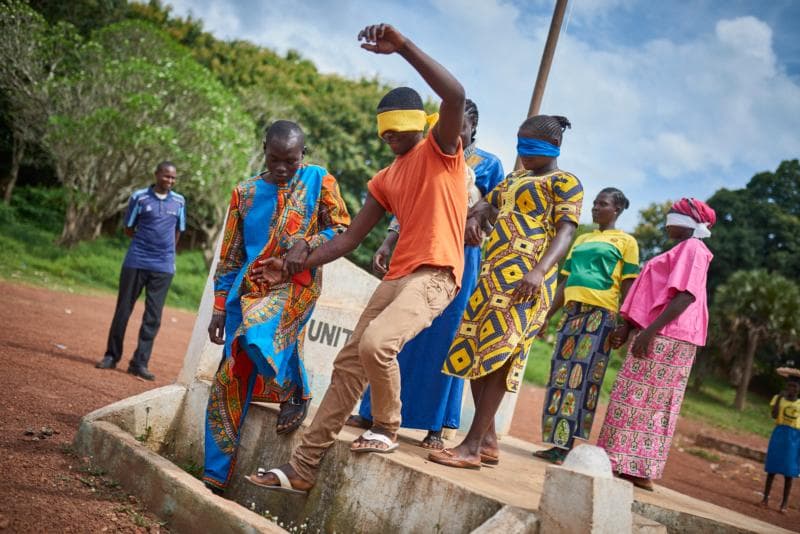YAOUNDÉ, Cameroon – Fears are growing that the Central African Republic could experience an upsurge of violence as it prepares for presidential elections later this year.
Last week, a UN peacekeeper was killed in the northwest of the country, in an attack allegedly carried out by an armed group that was part of a February 2019 peace agreement signed by the CAR government and 14 militias.
In 2013, a Muslim rebel group called Seleka took over the government of the country, giving rise to the pro-Christian anti-Balaka militia movement. Eventually, Seleka was driven out, but tit-for-tat violence between nominally Muslim and Christian groups continues to this day, and the central government has trouble exercising power outside of the capital Bangui.
The country is 80 percent Christian, 10 percent Muslim, with the rest mostly following indigenous faiths. The Muslims are concentrated in the north of the country, although many work as merchants in the south.
Christian militias have been hounding Muslims in many Christian majority areas, with Church leaders often offering their church compounds as a refuge.
The ongoing fighting has forced about a quarter of the country’s 4.5 million from their homes. Thousands more have been killed.
Ahead of this year’s elections, the UN is already expressing concern about the “influx of foreign fighters and weaponry” into the country.
According to a study carried out by the NGO Save the Children in 2015, 64 percent of children suffer from post-traumatic stress.
The Brothers of Charity – an international religious congregation with a strong commitment to various social justice issues – has taken the lead in providing care for young people with post-traumatic disorders.
“In the absence of adequate mental health care, psycho-traumatized persons could develop other mental pathologies due to major stress,” Brother Shungo Wababusho Dieudonné, a medical doctor serving in the country, told Crux.
“For children who have a state of post-traumatic stress, we also take care of them and provide them with psychosocial help. They study and we follow them regularly so that they can lead a quiet life and be able to study like their peers. We also organize child-friendly spaces to enable them to have healthy mental and physical health,” he said.
Here are excerpts of his interview with Crux.
How has the war affected young people, especially their mental health?
Dieudonné: War or armed conflict is among the causes of psychological trauma. The Central African Republic is not spared; many children, adolescents and adults have experienced horrific events. These events eventually affected their mental well-being. We observe in young people from, for example, the 3rd District [a neighborhood of the capital Bangui], a high number of users of psychoactive substances. Other districts are certainly affected.
In children and adolescents, manifestations of post-traumatic stress are observed such as: fear, enuresis – peeing in bed after 6 years, poor school performance, confusion, etc. Adolescents and adults are not spared at all. For example, adolescents and adults, especially males, use certain painkillers that they abuse in order to relieve their stress. Example: Tramadol. They also consume high-alcohol drinks and drugs. For example: Hemp.
Do you have any idea how many people suffer from Post-Traumatic Stress Disorders?
According to studies conducted by Save The Children in March 2015, 64 percent of children have a state of post-traumatic stress; 87.4 percent of children have a sub-syndromic form of a state of post-traumatic stress.
What could be the dangers for these people not having access to adequate health care?
In the absence of adequate mental health care, psycho-traumatized persons could develop other mental pathologies due to major stress, including acute delusional puff, schizophrenia, depression, excessive consumption of psychoactive substances.
What assistance have the Brothers of Charity given them and how do they respond to it?
As a congregation, we Brothers of Charity could not be indifferent to the suffering of our fellow men. Our patron Saint Vincent de Paul said: “The poor are masters.” And our founder paraphrased Jesus saying: “What you do to the least of you is to me you do.” Our role is to bring dignity and restore the tarnished image of our brothers and sisters affected by various mental illnesses, in general, and post-traumatic stress in particular.
We have established a center for psychosocial listening and mental health care (CEPSSM) with the objective of improving the quality of mental health care. Locally, mental illness is considered a bad spell, witchcraft … This qualifier of mental illness is followed by stigma.
That is why, as a congregation, we have created this center that provides quality care to patients suffering from mental illness – children, adolescents and adults affected by a state of post-traumatic stress. Now, the population gradually understands that mental illness is not necessarily bad luck or witchcraft. This is thanks to the awareness that we are conducting in different districts to explain and make the population understand the factors of vulnerability of mental illness, the management and the evolution of the disease. Being affected by mental illness is not a death sentence. One can be cared for and lead one’s life quietly.
For children who have a state of post-traumatic stress, we also take care of them and provide them with psychosocial help. They study and we follow them regularly so that they can lead a quiet life and be able to study like their peers. We also organize child-friendly spaces to enable them to have healthy mental and physical health.
Finally, how would you describe the security situation in the Central African Republic today and what are the paths to lasting peace?
The security situation? Currently relatively calm although there are some unrest in some areas. The paths to lasting peace must be justice, reconciliation, and forgiveness. There can be no lasting peace without justice.













